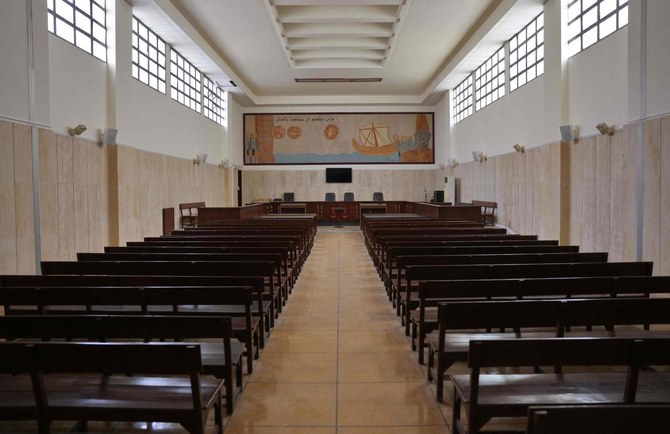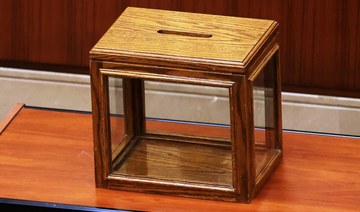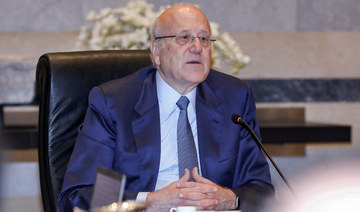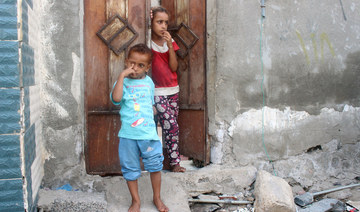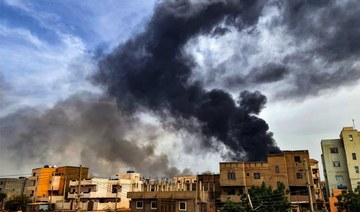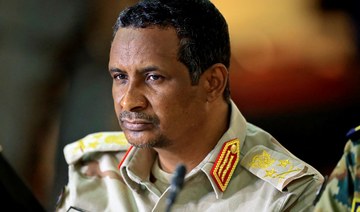BEIRUT: Taxi driver Youssef Daher has languished for months in prison without charge, one of scores stuck after Lebanese judges launched an open-ended strike in August to demand better wages in a collapsed economy.
Judges have suspended their work as rampant inflation eats away at their salaries, paralysing the judiciary and leaving detainees in limbo — the latest outcome of Lebanon’s years-long financial crisis.
From his jail cell in the northern city of Tripoli, Daher sends daily messages to his lawyer asking him whether judges have ended what is already the longest strike for their profession in Lebanese history.
“My family lost their sole breadwinner and must now rely on aid to survive,” he told AFP.
Daher has not seen his wife and three children since he was arrested eight months ago because they cannot afford transportation to get to the prison, he said.
Security forces arrested Daher after he gave a ride to a passenger accused of kidnapping — unbeknownst to him, he said.
Authorities did not press charges against Daher after questioning, so his lawyer requested his release. Then judges began their strike.
His request has been pending ever since.
Bureaucracy and rampant corruption have long delayed verdicts and judicial proceedings in Lebanon, where 8,000 people are estimated to be jailed, most of them awaiting a verdict.
But now, underfunded public institutions have taken a hit after the country’s economy went into free-fall in 2019, with basic state services like renewing passports or completing a real estate transaction often taking months to complete.
Although judges’ salaries are expected to triple as part of Lebanon’s 2022 budget, their wages are currently worth only around $160 on average due to soaring inflation.
“How can a judge live with his family on such a salary?” one striker asked, adding that some of his colleagues with chronic illnesses could no longer afford medication.
“Judges were forced to launch this strike because their financial situation has become unbearable,” he said.
Judges who spoke to AFP said they also wanted better working conditions as they had been forced to toil without electricity or running water and buy their own office supplies like pens and paper.
Lebanon’s state electricity provider produces an hour of daily power on average, forcing residents to rely on private generators that public institutions often cannot afford.
The judges’ strike has compounded an already bleak reality for detainees, many of whom spend months or years awaiting a verdict.
Lawyer Jocelyn Al-Rai said her client, a Syrian youth, was arrested two months ago on drug trafficking charges without a warrant and has yet to face questioning, because the public prosecutor’s office has stopped working.
Despite the strike, certain courts continue to function.
In Beirut on Thursday, a criminal court sentenced Hassan Dekko, a man known as the “Captagon King,” to seven years in prison with hard labor for producing and trafficking the stimulant, a judicial source said. Dekko had been arrested in April last year.
Yet the judges’ strike is also contributing to overcrowding in the already cramped prisons, stretching detention facilities that have seen increasing numbers of escape attempts, a source at the Palace of Justice in the Beirut suburb of Baabda told AFP.
“About 350 people used to be released from prison every month... that number has now been reduced to about 25,” said the source, adding that most are released after “mediators intervene with the judge handling the case.”
About 13 inmates who completed their sentences two and a half months ago have been stuck in the Palace of Justice’s cells because criminal courts have not met to sign off their release, he added.
A judicial source who declined to be named said detainees were bearing the brunt of the strike’s knock-on effects.
“Judges have a right to a decent life,” he said, but “detainees are also suffering from injustice, even those whose only crime was stealing a loaf of bread.”
Lebanon detainees stuck in limbo as judges’ strike drags on
https://arab.news/nch5n
Lebanon detainees stuck in limbo as judges’ strike drags on
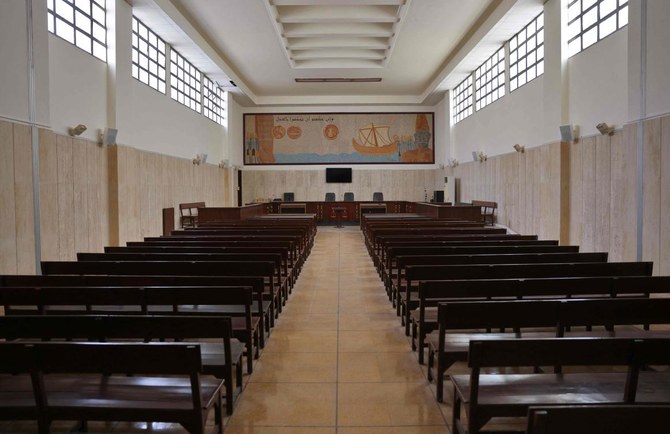
- Judges have suspended their work as rampant inflation eats away at their salaries, paralysing the judiciary and leaving detainees in limbo
- Bureaucracy and rampant corruption have long delayed verdicts and judicial proceedings in Lebanon
Leaders of Jordan and Pakistan call UAE president to express concern about effects of severe storm

- Leaders passed on their best wishes to the country as it recovers from the storms
DUBAI: The president of the UAE, Sheikh Mohammed bin Zayed Al-Nahyan, received telephone calls from King Abdullah of Jordan and Pakistan’s Prime Minister Shehbaz Sharif on Friday, during which they expressed concern about the effects of the severe weather, including unusually heavy rainfall, that battered parts of the country this week.
They also passed on their best wishes to the country as it recovers from the storms and “conveyed their heartfelt hopes for the safety and prosperity of the UAE and its people, praying for their protection from any harm,” the Emirates News Agency reported.
Sheikh Mohammed thanked both leaders for their warm sentiments, and emphasized the strong bonds between the UAE and their nations.
The UAE and neighboring Oman were hit by unprecedented rainfall and flooding on Tuesday, with more than 250 millimeters of rain falling in parts of the Emirates, considerably more than is normally seen in a year. Dubai International Airport was forced to close temporarily when runways were flooded.
Peshmerga fighter dies in Turkish strike in north Iraq

JEDDAH: A member of the Kurdish Peshmerga security forces was killed on Friday in a Turkish drone strike in the autonomous Kurdistan region of northern Iraq.
Ankara regularly carries out ground and air operations in the region against positions of the outlawed PKK, the Kurdish separatist group that has waged a decades-long insurgency against the Turkish state.
The victim of Friday’s attack died in a drone strike on his vehicle, said Ihsan Chalabi, mayor of the mountainous Sidakan district near Iraq’s borders with Turkiye and Iran.
For decades, Turkiye has operated several dozen military bases in northern Iraq in its war against the PKK, which Ankara and its Western allies consider a terrorist group.
Both Baghdad and the Kurdish regional government have been accused of tolerating Turkiye’s military activities to preserve their close economic ties.
At the beginning of April, a man described as “high-ranking military official” from the PKK was killed in a Turkish drone strike on a car in the mountainous Sinjar region, according to the Kurdistan counterterrorism services.
Turkish President Recep Tayyip Erdogan is expected to visit Baghdad on Monday on his first official visit to Iraq since 2011.
Iraq’s Defense Minister Thabet Al-Abassi in March ruled out joint military operations against the PKK, but said that Turkiye and Iraq would “work to set up a joint intelligence coordination center.”
Middle East in ‘shadow of uncertainty due to regional conflicts’

WASHINGTON: Economies in the Middle East and North Africa face a “shadow of uncertainty” from ongoing tensions in the region, a senior IMF official said.
“We are in a context where the overall outlook is cast into shadows,” Jihad Azour, the International Monetary Fund’s director for the Middle East and Central Asia department, said in an interview in Washington.
“The shadow of uncertainty on the geopolitical side is an important one,” added Azour, a recent candidate for the next Lebanese president.
In the face of the ongoing conflicts in Gaza and Sudan and a recent cut to oil supplies by Gulf countries, the IMF has pared back its growth outlook for the Middle East and North Africa region once again.
FASTFACT
Economic activity in Gaza has ‘come to a standstill’ and the IMF estimates that economic output in the West Bank and Gaza contracted by six percent last year.
The IMF expects growth in MENA of 2.7 percent this year — 0.2 percentage points below its January forecast — before picking up again next year, the IMF said in its regional economic outlook report.
The risks to growth in the MENA region remain heightened, the IMF said, pointing to the danger of greater regional spillovers from the ongoing Israel-Gaza war.
“We have concerns about the immediate and lasting impact of conflict,” Azour said.
The IMF report said that economic activity in Gaza has “come to a standstill” and estimates that economic output in the West Bank and Gaza contracted by 6 percent last year.
The IMF said the report excludes economic projections for the West Bank and Gaza for the next five years “on account of the unusually high degree of uncertainty.”
The IMF cannot lend to the West Bank and Gaza because they are not IMF member countries.
However, Azour said it has provided the Palestinian Authority and the central bank with technical assistance during the current conflict.
“When we move into the reconstruction phase, we will be part of the international community support to the region,” he added.
Azour also discussed the situation in Sudan, where thousands have been killed in a civil war that has also devastated the economy, causing it to contract by almost 20 percent last year, according to the IMF.
“The country is barely functioning, institutions have been dismantled,” he said.
“And for an economy, for a country like Sudan, with all this potential, it’s important to stop the bleeding very quickly and move to a phase of reconstruction,” he added.
The recent Houthi attacks have particularly badly hit the Egyptian economy on Red Sea shipping, which caused trade through the Egypt-run Suez Canal to more than halve — depriving the country of a key source of foreign exchange.
Egypt reached an agreement last month to increase an existing IMF loan package from $3 billion to $8 billion after its central bank hiked interest rates and allowed the pound to plunge by nearly 40 percent.
A key pillar of the current IMF program is the privatization of Egypt’s state-owned enterprises, many of which are owned by or linked to the military.
“This is a priority for Egypt,” Azour said. Egypt needs to have a growing private sector and give space for the private sector to create more jobs.”
“We have an opportunity to re-engineer the state’s role, to give the state more responsibility as an enabler and less as a competitor,” he said.
Oxfam director urges global support for refugees in Jordan
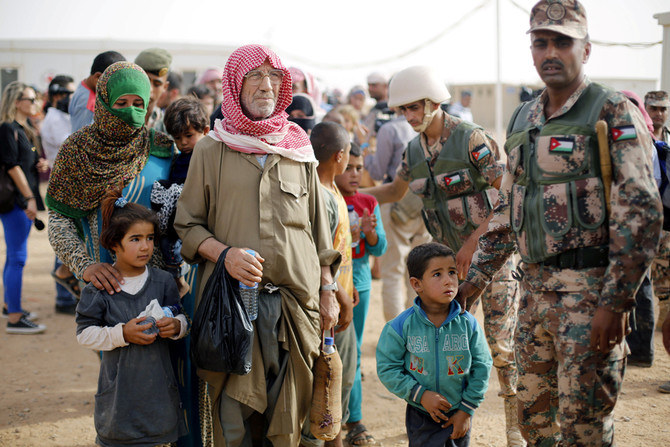
- Dmitry Medlev speaks of impact of over 3m people from neighboring areas
LONDON: Oxfam’s country director in Jordan said on Friday the global community had a responsibility to support refugees, especially in light of unrest in the Middle East.
In an interview with the Jordan News Agency, Dmitry Medlev described how an influx of over 3 million refugees from neighboring areas had stretched Jordan’s economic resources, disrupted local communities, and burdened public services.
He described the refugee’s experience as harrowing, often involving the painful process of abandoning the individual’s homeland and everything they held dear.
He said: “We are sending a message to the world not to overlook the refugee problem and to keep its focus on the new global disasters created by humans or caused by natural disasters, and the conflicts that have emerged in several countries recently, because the refugee problem is draining host countries and imposing additional burdens on them that they may not be able to bear in the future.”
Medlev called for enhanced international cooperation and adherence to international humanitarian law in supporting refugees, underscoring the need for long-term solutions to the ongoing crisis.
He also spoke of Oxfam’s initiatives in Jordan, such as the Waste to Positive Energy project in partnership with the Federal Ministry of Economic Cooperation and Development, and the EU, and executed with the German Corporation for International Cooperation. The project focuses on waste management and recycling in Zaatari Camp and Mafraq Governorate, processing about 30 tonnes of waste per day.
Medlev also pointed out Oxfam’s efforts in promoting economic and climate justice through grants aimed at empowering local projects led by women and youngsters. These grants help enhance project efficiency, ensure sustainability, and connect beneficiaries with supportive institutions.
He outlined Oxfam’s five-year strategy in Jordan, which focuses on gender justice, climate justice, and economic justice, and aims to bolster the country’s preparedness for disasters, enhance employment opportunities, and provide humanitarian support for refugees.
Jordan’s King Abdullah II told the UN General Assembly in September that the world must not abandon Palestinian refugees to the forces of despair.
Sudanese rue shattered dreams as war enters second year
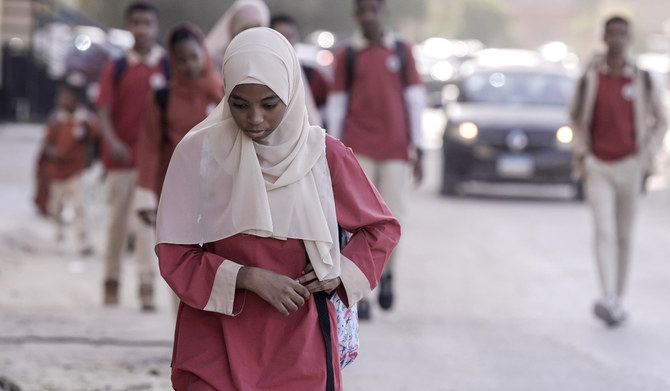
- Bashir’s ouster in April 2019 ushered in a civilian-led transition that saw an outpouring of “hope, inspiration and vibrancy” among young Sudanese, said Samah Salman, who worked in corporate venture capital then
DUBAI: Lawyer Omar Ushari still remembers the hope that gripped Khartoum after the uprising that overthrew President Omar Bashir in 2019. Now, after a year of war between rival generals, much of the Sudanese capital lies in ruins.
The 46-year-old, then detained for his activism, celebrated behind bars when Bashir was toppled in a palace coup.
In the heady days that followed, as the army promised a transition to elective civilian rule, Ushari was released and set to work on his dream project: a literary cafe near the banks of the Nile.
Named Rateena, his cafe swiftly became known as a safe haven for young activists eager to contribute to building a “better Sudan.”
But on April 15 last year, the Sudanese army and the paramilitary Rapid Support Forces went to war, and Ushari watched both his project and his dreams for the country “fade, bit by bit.”
BACKGROUND
Omar Bashir’s ouster in April 2019 ushered in a civilian-led transition that saw an outpouring of ‘hope, inspiration and vibrancy’ among young Sudanese, says Samah Salman, who worked in corporate venture capital then.
For months, he braved raging street battles to visit Rateena, “sit in the dark, take stock of what had been looted since my last visit, and reminisce.”
He did not understand how “the music that filled the space, the lectures and debates people shared, had been replaced with stray bullets strewn around me and the sound of tank fire outside.”
Now, as the war has entered its second year, with thousands dead and millions more driven from their homes, Ushari says he is “only one of the thousands of dreams shattered” — a microcosm of “a stolen revolution.”
Bashir’s ouster in April 2019 ushered in a civilian-led transition that saw an outpouring of “hope, inspiration and vibrancy” among young Sudanese, said Samah Salman, who worked in corporate venture capital then.
Startups were “springing up all across Sudan,” she said from the US, “all building extraordinary solutions to real needs ordinary Sudanese people were facing.”
Salman reviewed over 50 startups in telehealth, agritech, renewable energy, logistics, and fintech solutions, crediting the boom to “the energy of the revolution.”
According to Ushari, “hopes were high that Sudan was finally on the right path, out of the shadows and heading toward democracy, toward freedom.”
Like countless others, communications expert Raghdan Orsud, 36, wanted to play her part.
She co-founded Beam Reports to investigate disinformation in Sudan — “out of the belief in the role media can play in democratic transition,” she said from London.
But that transition ended in October 2021, two months after Beam Reports launched.
The same generals who would later go to war — army chief Gen. Abdel Fattah Al-Burhan and his then-deputy RSF commander Gen. Mohammed Hamdan Dagalo — ousted civilians from the transitional administration.
“Nothing was the same after the coup,” Ushari said.
“It was a painful time. They were killing protesters every week, but still, we had hope.”
Then, one fateful Saturday at the end of Ramadan, the people of Khartoum awoke to the sounds of air strikes and shelling as their worst fears came true: the erstwhile allies had turned their guns on each other.
Bodies began piling up on the streets as vicious urban warfare drove millions to flee.
Orsud had just bought studio-grade recording equipment, “still in their boxes,” when RSF paramilitaries seized and looted her offices.
Ushari was piecing together a life in Cairo when he received a video message showing a massive fire.
“That’s how I found out Rateena had burned down,” he said.
Countless Sudanese in the diaspora — who had spent decades saving up to build their Khartoum homes — have been forced to watch from afar as the RSF looted them.
“At some point, he was praying for an airstrike to hit the house,” pastry chef Shaimaa Adlan, 29, said in Cairo, referring to her father in Saudi Arabia.
“He would have rather seen it destroyed than know his life’s work was being used as a paramilitary base.”
Adlan had started a catering business in Khartoum before finding herself in Egypt — uprooted and jobless.
But barely a year later, she sprints through a bustling kitchen in Cairo, shouting orders to her staff and fussing over dishes.
Back home, Salman says the war has not crushed Sudanese entrepreneurialism, just redirected it.
She said tech entrepreneurs now crowdsource real-time safety updates instead of protest plans and optimize evacuation paths instead of delivery routes.
The same young people organizing demonstrations now coordinate aid, becoming what the UN calls “the front line” of humanitarian response.
And in displacement centers and the diaspora, the dream of a new Sudan has not been forgotten.
“No matter where we’ve been exiled or what remote Sudanese state we’ve ended up in, there’s still a spark of the revolution left in every heart,” Ushari said.
“Sudan is ours, it’s all of ours,” said Orsud, whose fact-checking team has resumed operations from Nairobi.
“What else would we do besides rebuild it, over and over?“


